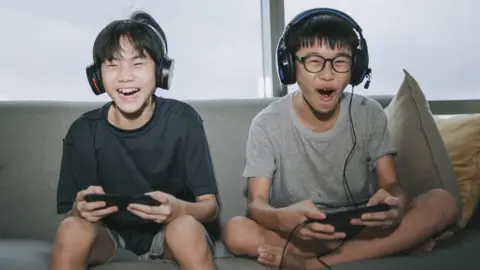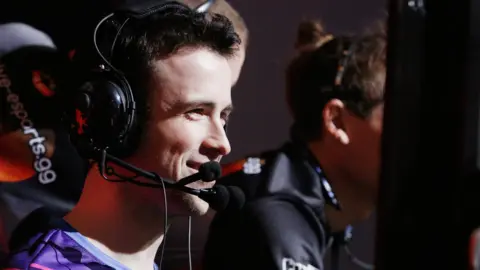Tech Tent - China's crackdown on young gamers
 Edwin Tan
Edwin TanThree hours a week? Imagine the outrage if young British or American online gamers were told, as children in China have been, that this was the maximum time they could spend on their pastime.
After all, that's how long many spend daily just watching their favourite gamers playing on streaming platforms like Twitch.
This week's Tech Tent looks at two stories which show how China and the West are diverging when it comes to attitudes to online gaming.

In China, the government plans to tighten already strict rules on the time children spend gaming online and be fairly confident they will be largely obeyed. California-based Rui Ma, who hosts the Tech Buzz China podcast, explains that the government relies on the games industry, and notably its leading player Tencent, to enforce the rules using facial recognition.
"You have to tie your real ID to your account. And Tencent actually makes you scan your face if you're playing late at night for more than a set period of time. So even if your ID says you're an adult, if you're playing late at night, they'll assume that you're a minor unless you scan your face."
Such intrusive regulation, especially as it affects adults as well as children, would be unacceptable in many countries.
But Lisa Cosmas Hanson, whose market research firm Niko Partners analyses the Asian games market, points out that for years China banned the import of games consoles.
"The Chinese government has always been transparent, saying we are here to protect our youth against what we consider harmful content and harmful behaviours," she says.
China, of course, has a powerful, fast-growing games industry, and while there should be little impact on it in the short term, eventually Ms Hanson sees a threat to the next generation of developers and professional players.
"That is the troublesome part, especially in terms of e-sports, this will be a big change. You need to train for your sport, and e-sports is a sport, and if they're not able to train, then what happens?"
Meanwhile, in the West, competition between the game-streaming platforms to attract star players is hotting up.
For football fans the big news this week has been the transfer of Cristiano Ronaldo from Juventus to Manchester United, but for many gamers the bombshell was two of Twitch's biggest stars - TimTheTatman and DrLupo - moving to streaming competitor YouTube.
 Getty Images
Getty ImagesAt 34 Ben Lupo, who made his name playing Fortnite, may, like Ronaldo, not have too many years left at the top. He made it clear that money was the big factor in switching to YouTube. "Like, why does anybody go to work, guys?" he told his fans.
Deep pockets
Twitch, owned by Amazon, has been the dominant player, a platform where millions are happy to show their admiration for star gamers by handing them cash, even though there is no paywall.
But YouTube, says Louise Shorthouse, senior games analyst at Ampere Analysis, is growing in a way that may prove attractive to some of Twitch's stars.
"In places like India, south-east Asia, South America, YouTube is the dominant platform for watching games content. And so they represent new audiences who are also growing," she says.
However, Twitch may not be too worried - other deserters have returned after disappointing experiences elsewhere, notably Tyler "Ninja" Blevins, who signed up for big money to Microsoft's streaming service Mixer, only for it to shut down within a year.
Both Twitch and YouTube, with the deep pockets of Amazon and Google behind them, seem prepared to spend heavily to attract and keep celebrity streamers.
They know that the key to boosting their revenues is keeping viewers glued to their services, and seeing ads for longer. So they will be grateful that few governments are likely to follow China in curbing the time young gamers spend online.
